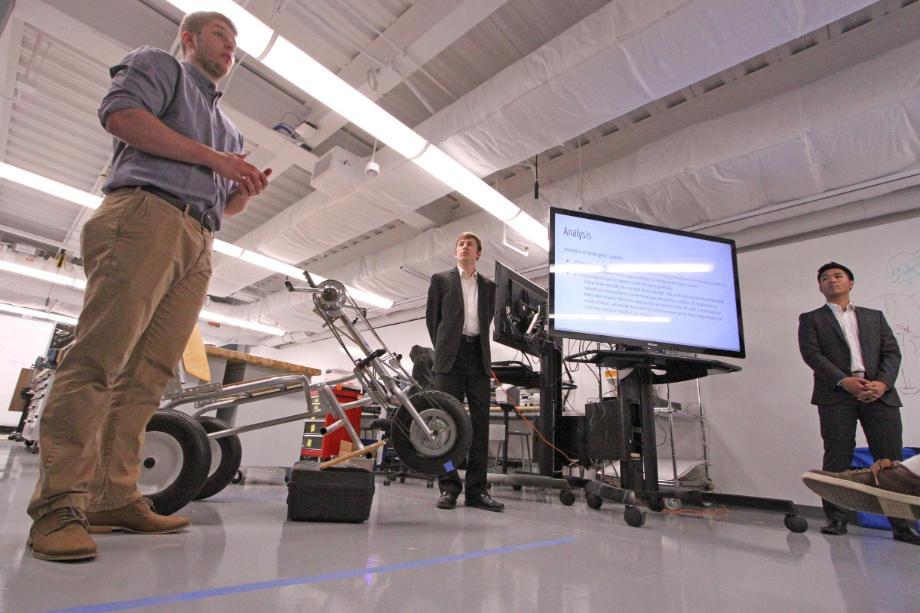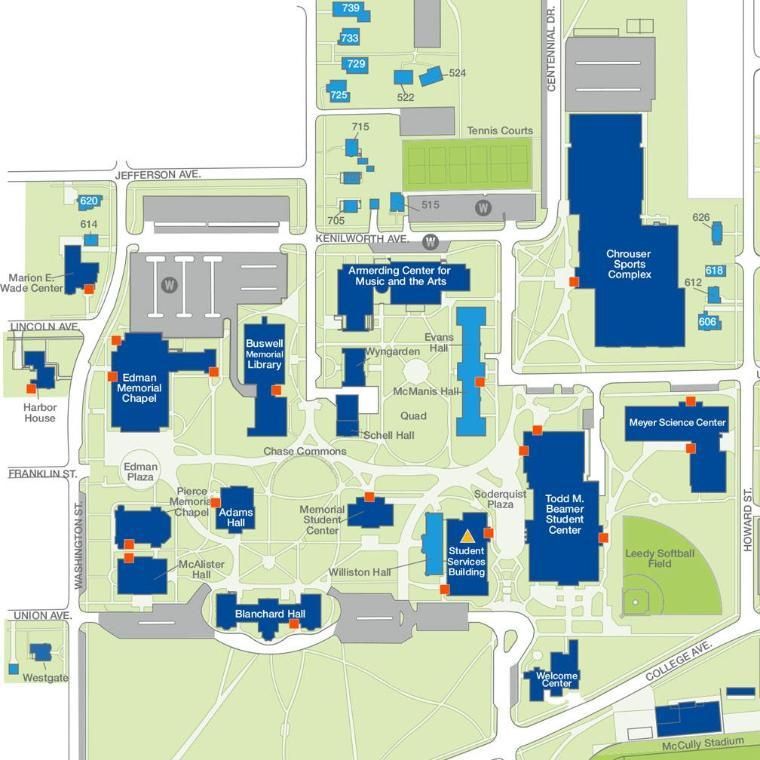Join us for STEM Visit Day
Come to campus to learn more about Wheaton's STEM programs! Join current students and faculty Sunday evening through Monday afternoon - take a class, work in the labs, meet our world-class faculty, learn about student research opportunities, and more! Students also have the option to stay overnight in the residence hall with a current Wheaton student to experience community life at Wheaton.
Fall 2024 dates coming soon!

Day 1
3:30pm - Registration
4:00pm - Welcome Session
4:30pm - Campus Tour
6:00pm - Dinner
6:45pm - Current Student Q&A Panel
8:00pm - Meet your overnight host // Game Night
Day 2
8:45am - Welcome Back with Coffee/Pastries
9:20am - STUDENTS: Attend a Class // PARENTS: Admissions and STEM Info Session
10:40am - Chapel
11:35am - Options: Lunch, Class Visit, Pre-Health Info Session, Research Poster Session, or meet Education Dept Faculty
12:55pm - Options: Lunch, Class Visit, or meet Education Dept Faculty
2:15pm - Interactive Open House and Tour through Meyer Science Center
4:00pm - Closing Session
Travel Tips
If you are traveling by plane, we recommend either renting a car or contacting a taxi company for transportation to and from the airport. Check out more on directions and transportation. You can also access local lodging discounts using our travel portal.
Parking Information
Parking will be available in the East Billy Graham Hall lot across the street from the Welcome Center. View a campus map.
Curious about our majors and programs? Check out our Natural Sciences page for more information!
When you participate in Wheaton’s STEM visit day, you get to meet our faculty, talk with current students, and observe the quality of our programs first-hand. Wheaton STEM faculty are research active, meaning they conduct research in addition to teaching. Their work routinely culminates in publications in top STEM journals. Many receive grant funding from organizations such as the National Science Foundation, the National Institutes of Health, and the Templeton Foundation. On average, STEM faculty at Wheaton collectively publish 20 peer-reviewed journal articles, write 4 textbooks or scholarly monographs, secure 2 patents, and receive over $300,000 in grant funding each year.
With this level of sustained scholarship on Wheaton’s campus, our STEM students know they are being taught by first-rate faculty and have options to be involved in all aspects of the research process. Many of our students also travel and present their research at national or international meetings and become co-authors on publications.
Check out this article from the Summer 2022 issue of Wheaton magazine for a quick glimpse at just some of our faculty research projects: Witnessing Creation
Recent Grants
- Jim Schroeder (Physics and Engineering) was awarded an NSF CAREER grant ($522,656 over 5 years) to study electron acceleration and diffusion in the Earth’s outer radiation belt. Dr. Schroeder’s research helps scientist understand weather events in space and the causes of the aurora borealis (northern lights). You can hear him talk about his latest findings on NPR’s Science Friday.
- Nate Thom (Biological and Health Sciences) and Dr. Taylor Worley (Art History) received a Templeton Religion Trust grant to investigate the psychophysiological effects of viewing conceptual art ($262,741 over 2 years)
- Nadine Rorem (Biological and Health Sciences) was awarded a National Oceanic and Atmospheric Administration Sea Grant to investigate freshwater jellyfish blooms ($199,601 over 3 years).
- Dan and Lisa Burden (Chemistry) were awarded a National Science Foundation grant to study biological nanovalves ($352,070 over 3 years).
- Wheaton College Division of Natural Sciences received a Templeton grant ($192,000 over 3 years), administered by the Council for Christian Colleges and Universities (CCCU) and Scholarship and Christianity in Oxford (SCIO), to fund research and outreach at the interface of science, religion, and society.
Highlighted Publications
- Chris Keil (Earth and Environmental Science) wrote and edited a book of case studies in environmental health: A Case-Based Introduction to Modeling Occupational Inhalation Exposures to Chemicals. Falls Church, Virginia: AIHA, 2023.
- Peter Walhout (Chemistry) and student Zhe He teamed up with collaborators at Michigan State (B. Dutagaci, G. Nawrocki, and M. Feig) to publish: "Molecular Dynamics Simulations of Rhodamine B Zwitterion Diffusion in Polyelectrolyte Solutions." Journal of Physical Chemistry B 126:48 (2022): 10256-10272.
- L. Kristen Page (Biological and Health Sciences) published: The Wonders of Creation: Learning Stewardship from Narnia and Middle-Earth. Downers Grove, IL: IVP Academic, 2022. Dr. Page was the first natural scientist to deliver the Hansen Lectures based on the work of Wade Center authors, J.R.R. Tolkien and C.S. Lewis. Her project considers what Tolkien and Lewis can teach Christians about ecological stewardship using lessons from the authors’ imaginative worlds.
- Thomas VanDrunen (Math and Computer Science) published: Algorithmic Commonplaces. Franklin, Beedle 2023.
- Vanya Tepavčević (Biological and Health Sciences), together with students Kaiti Yarrington and Angel Lin and collaborators at Loyola University (B. Fung and K. L. Visick), published: “sRNA chaperone Hfq controls bioluminescence and other phenotypes through Qrr1-dependent and -independent mechanisms in Vibrio fischeri.” Gene, 809:146048 (2022).
- Paul Isihara (Math and Computer Science) and Dr. Andrew Luhmann (Earth and Environmental Science), along with students Lucy Henneker, Nathaniel Bowden, Daws Bremner, Jonathan Higgins, Stephen McKay, and Julio Reyes, published: “A groundwater contaminant extraction model using complex potentials.” Journal of Undergraduate Mathematics and its Applications (UMAP Journal) 43:1 (2022): 39-76.
- Isihara also collaborated with Dr. Peter Jantsch (Math and Computer Science) and students Christian Cameron, Nathan Varberg, Demetrius Crawford, Sean Ferguson, Lucy Renneker, Andy Holmberg, Gracie Johnson, Olivia Pearsall, Andy Peterson, Christopher Plimpton, and Kiki Rogers to publish: “The Chicago Hardship Index: An Introduction to Urban Inequity.” Journal of Statistics and Data Science Education 29:3 (2021): 328-36.
- Jim Schroeder (Physics and Engineering) teamed up with colleagues at the University of Iowa, UCLA, and the Space Science Institute (G. G. Howes, C. A. Kletzing, F. Skiff, T. A. Carter, S. Vincena, and S. Dorfman) to publish ground breaking work on the northern lights: “Laboratory measurements of the physics of auroral electron acceleration by Alfvén waves.” Nature Communications 12:3103 (2021).
- Trevor Gilkerson, Class of 2024 - Experiential Learning in Wheaton’s Engineering Program
- Lucy Browning, Class of 2024 - Liberal Arts through the Eyes of a Health Science Major
- Joshua Price, Class of 2023 - When Computer Science Meets Ministry

Find helpful information for your visit, including campus maps, directions, and lodging information.